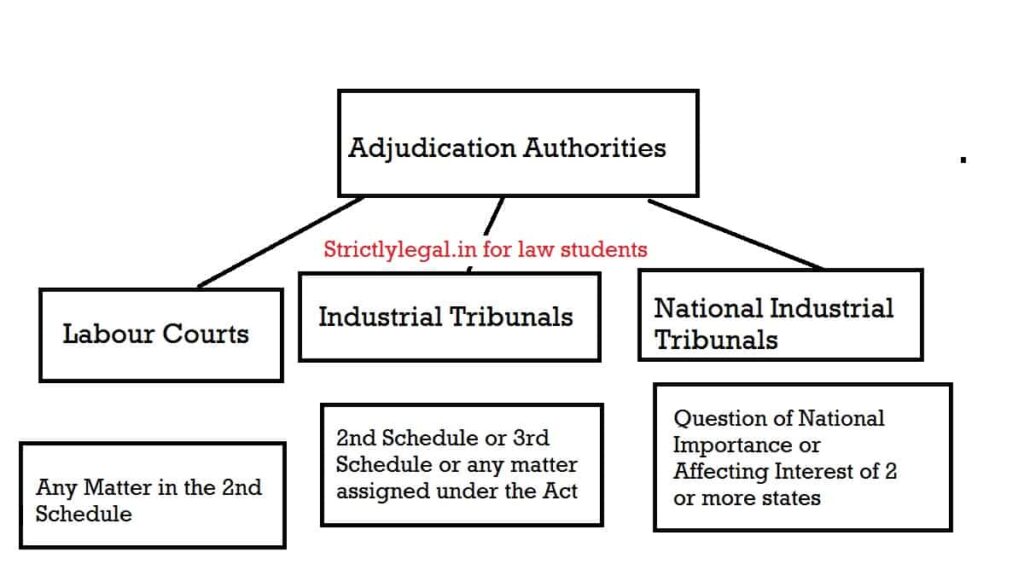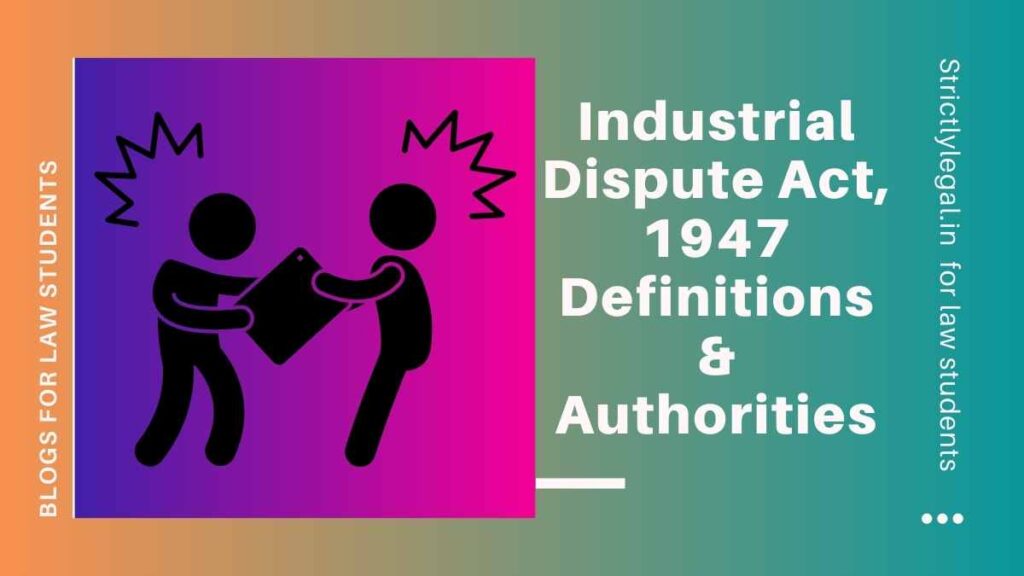The Industrial Dispute Act, 1947 was enacted on the 11th of April 1947. The objective of the Act is to secure Industrial peace and harmony by providing machinery and procedure for investigation and settlement of industrial disputes by negotiations through appropriate authorities.
This labour Act contains 40 Sections divided into 7 Chapters and provides provisions for retrenchment, procedure for layoff, rules and regulations regarding strikes and lockouts.
Table of Contents
Important definitions
What is the definition of “Industry” under the Industrial dispute Act, 1947?
“industry” means any systematic activity carried on by co-operation between an employer and his workmen (whether such workmen are employed by such employer directly or by or through any agency, including a contractor) for the production, supply or distribution of goods or services with a view to satisfy human wants or wishes (not being wants or wishes which are merely spiritual or religious in nature), whether or not,–
Section 2(J) Industrial Dispute Act, 1947
(i) any capital has been invested for the purpose of carrying on such activity; or
(ii) such activity is carried on with a motive to make any gain or profit.
The definition is already contained in section 2(k) of the ID Act, 1947 and the Supreme Court has elaborated the same in Bangalore Water Supply and Sewerage Board v. R. Rajappa (AIR 1978 SC 548.) as follows:
- Any Activity will fall under the definition of Industry if it passes the ‘triple test’
>Systematic and organized activity
>With the cooperation between Employers and employees
>or the production and distribution of goods and services whether or not capital has been invested for this activity. - It was observed that for any establishment to be ‘Industry’ the motive of profit-making or gainful motive is not necessary.
- If the organization is a trade or business it does no cease to be one because of philanthropy animating the triple test, cannot be exempted from the scope of the definition of ‘industry’.
- The nature of activity involved must be functional and decisive with functional emphasis on the employer-employee relationship.
However, certain exceptions was also provided like Casual activities,Single lawyer, Rulal medical practitioner, small professionals, handicraft, bakers etc because they either don’t have employer-employee relationship or have no sytematic activity,
What is the meaning of ‘Industrial Dispute’ under the Act?
“industrial dispute” means any dispute or difference between employers and employers or between employers and workmen, or between workmen and workmen, which is connected with the employment or non-employment or the terms of employment or with the conditions of labour, of any person;
Section 2(k) Industrial Disputes Act, 1947
Conditions of Industrial dispute
Factum
The provisions of industrial dispute act 1947 state that there must be a real dispute between the workmen and the employer or between the workmen and workmen or between employer and employer. That is any such demand will be considered as dispute only if it is rejected by the employer. The crux is that the demand must be rejected by the employer for the existence of Industrial dispute.
In the case of Sindhu Resetllement corporation ltd v. Industrial tribunal (1968), It was observed that a mere demand to a government without a dispute being raised by workmen with their employer cannot become industrial dispute.
In the case of M/s Village papers Pvt. Ltd. V. S.O himachal Pradesh (1993) It was observed that
- A mere demand to employer cannot become Industrial dispute without being raised with the employer.
- Government may forward the demand of the workmen to the employer and if it is rejected, it becomes an Industrial dispute.
- Demand need not be sent directly to the employer nor expressly.
- Date of making reference is required.
- Only disputes existed or apprehended can be referred.
Parties to dispute
According to section 2(k) of the ID Act, the dispute must be between the workmen and the workmen or between the workmen and the employer or between employer and employer.
In Bangalore WC and Milla co V. Their Workmen (1968) SC it was held that when trade unjion raises any dispute of a workman are deemed to be the party to the dispute.
Subject Matter of Industrial dispute
The Subject matter of the dispute must be connected with
- Employment or
- Non-employment or
- In with the terms of employment or
- Conditions of labour of any person.
What does “Any Person” under the Act mean?
The court held that “Any person” cannot mean anybody. The term is limited to employee or the workmen employed in any industry. The expression ‘any person’ mean in whose employment, non-employment, terms of employment, or conditions of labour of any person the workmen has a direct and substantial interest.
Various Authorities under the Industrial Dispute Act
Authorities under industrial dispute act has the power to hear and adjudicate or settle disputes. The various authorities are:
Works Committee
Works Committee.- (1) In the case of any industrial establishment in which one hundred or more workmen are employed or have been employed on any day in the preceding twelve months, the appropriate Government may by general or special order require the employer to constitute in the prescribed manner a Works Committee consisting of representatives of employers and workmen engaged in the establishment so however that the number of representatives of workmen on the Committee shall not be less than the number of representatives of the the Indian Trade Unions Act, 1926 (16 of 1926).
(2) It shall be the duty of the Works Committee to promote measures for securing and preserving amity and good relations between the employer and workmen and, to that end, to comment upon matters of their common interest or concern and endeavour to compose any material difference of opinion in respect of such matters.
Section 3 of ID ACT, 1947
Conciliation Officers
Conciliation officers.- (1) The appropriate Government may, by notification in the Official Gazette, appoint such number of persons as it thinks fit, to be conciliation officers, charged with the duty of mediating in and promoting the settlement of industrial disputes.
Section 4. of Id Act, 1947
(2) A conciliation officer may be appointed for a specified area or for specified industries in a specified area or for one or more specified industries and either permanently or for a limited period.
If the conciliation officers fail to resolve the dispute he should report it to the appropriate government and if necessary the dispute shall be referred to the board, labour court, tribunal or national tribunal by the appropriate government.
Conciliation Board
Boards of Conciliation.- (1) The appropriate Government may as occasion arises by notification in the Official Gazette constitute a Board of Conciliation for promoting the settlement of an industrial dispute.
(2) A Board shall consist of a chairman and two or four other members, as the appropriate Government thinks fit.
(3) The chairman shall be an independent person and the other members shall be persons appointed in equal numbers to represent the parties to the dispute and any person appointed to represent a party shall be appointed on the recommendation of that party: Provided that, if any party fails to make a recommendation as aforesaid within the prescribed time, the appropriate Government shall appoint such persons as it thinks fit to represent that party.
(4) A Board, having the prescribed quorum, may act notwithstanding the absence of the chairman or any of its members or any vacancy in its number: Provided that if the appropriate Government notifies the Board that the services of the chairman or of any other member have ceased to be available, the Board shall not act until a new chairman or member, as the case may be, has been appointed.
Section 5 Id Act, 1947
It is the duty of the Conciliation board to do all things as far as possible for a fair and amicable settlement of the Industrial Dispute.
Court of enquiry
Courts of Inquiry.- (1) The appropriate Government may as occasion arises by notification in the Official Gazette constitute a Court of Inquiry for inquiring into any matter appearing to be connected with or relevant to an industrial dispute.
(2) A Court may consist of one independent person or of such number of independent persons as the appropriate Government may think fit and where a Court consists of two or more members, one of them shall be appointed as the chairman.
Section 6 ID Act, 1947

Adjudicating Authorities
The Industrial Dispute Act enlists three adjudicating authorities viz Labour Courts, Tribunals and National Industrial tribunals. Adjudicating authorities may refer to competent authorities who have been entrusted with the jurisdiction and powers to pass such orders as may be necessary and such orders shall be binding on the parties. It must be noted that the other authorities under the Act such as conciliation board, works committee are not Adjudicating authorities. They are merely set up for a ‘fair and amicable settlement’.
If such authorities are unable to settle the matter then the same is referred to the adjudicating authorities for disposal.
Labour Courts
7. Labour Courts.- (1) The appropriate Government may, by notification in the Official Gazette, constitute one or more Labour Courts for the adjudication of industrial disputes relating to any matter specified in the Second Schedule and for performing such other functions as may be assigned to them under this Act.
(2) A Labour Court shall consist of one person only to be appointed by the appropriate Government.
Section 7 of Industrial Disputes Act 1947
Constitution
Section 7(3) states that a person can be appointed as a chairman of the labour code only if
- He is or has been a judge of the high Court or
- He has, for a period of not less than three years, been a District Judge or an Additional District Judge; or
- he has held any judicial office in India for not less than seven years; or
- he has been the presiding officer of a Labour Court constituted under any Provincial Act or State Act for not less than five years.
Industrial Tribunals
7A. Tribunals.- (1) The appropriate Government may, by notification in the Official Gazette, constitute one or more Industrial Tribunals for the adjudication of industrial disputes relating to any matter, whether specified in the Second Schedule or the Third Schedule [and for performing such other functions as may be assigned to them under this Act]
Section 7A Industrial Disputes Act
Constitution
(2) A Tribunal shall consist of one person only to be appointed by the appropriate Government.
(3) A person shall not be qualified for appointment as the presiding officer of a Tribunal unless– (a) he is, or has been, a Judge of a High Court; or
1[(aa) he has, for a period of not less than three years, been a District Judge or an Additional District Judge;
(4) The appropriate Government may, if it so thinks fit, appoint two persons as assessors to advise the Tribunal in the proceeding before it.
National Tribunal
7B. National Tribunals.- (1) The Central Government may, by notification in the Official Gazette, constitute one or more National Industrial Tribunals for the adjudication of industrial disputes which, in the opinion of the Central Government, involve questions of national importance or are of such a nature that industrial establishments situated in more than one State are likely to be interested in, or affected by, such disputes.
Section 7B
Constitution
(2) A National Tribunal shall consist of one person only to be appointed by the Central Government.
(3) A person shall not be qualified for appointment as the presiding officer of a National Tribunal [unless he is, or has been, a Judge of a High Court].
(4) The Central Government may, if it so thinks fit, appoint two persons as assessors to advise the National Tribunal in the proceeding before it.
Section 7B
Arbitration
Voluntary reference of disputes to arbitration
Under section 10(a): An arbitrator is appointed by the government. In case of disputes or in situations where a dispute has been apprehended the workmen and the employer may in writing approach for the arbitration and such person shall, undertake the investigation and give arbitration awards( final decision or settlement or decree) but before the same has been referred to the labour court, tribunals or national tribunal under section 10.
Grievance settlement authority
9C. Setting up of Grievance Settlement Authorities and reference of certain individual disputes to such authorities.-(1) The employer in relation to every industrial establishment in which fifty or more workmen are employed or have been employed on any day in the preceding twelve months shall provide for, in accordance with the rules made in that behalf under this Act, a Grievance Settlement Authority for the settlement of industrial disputes connected with an individual workman employed in the establishment.
9C of Industrial Disputes Act

Passionate about using the law to make a difference in people’s lives. An Advocate by profession.





